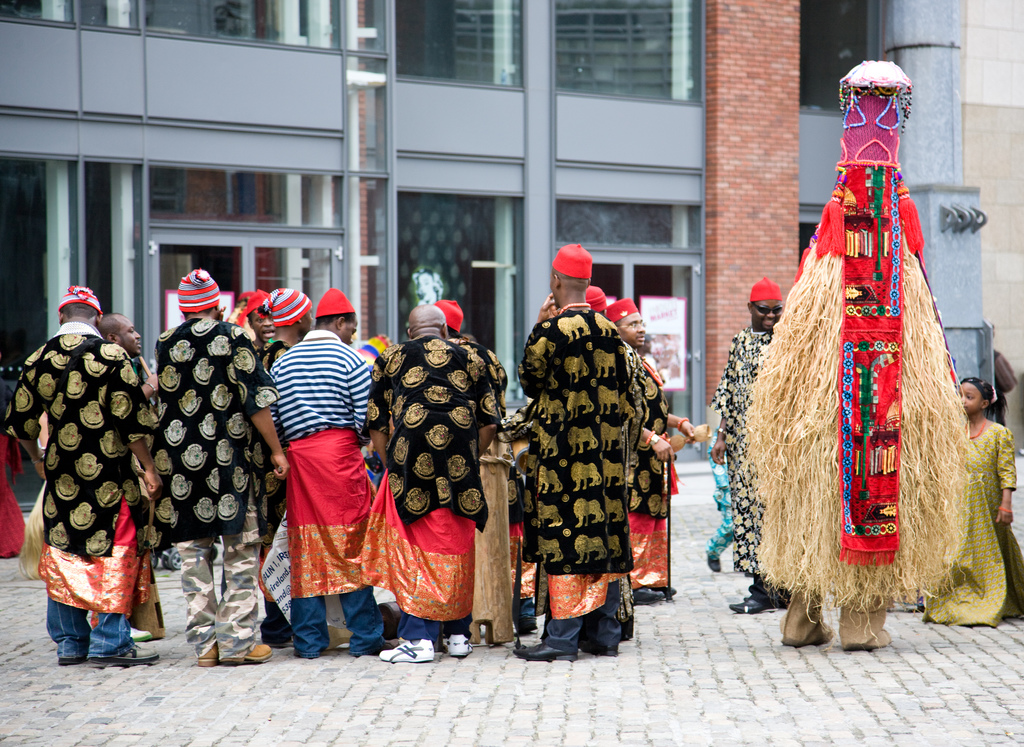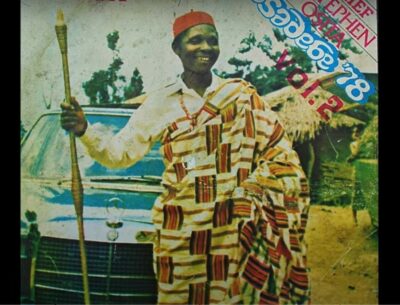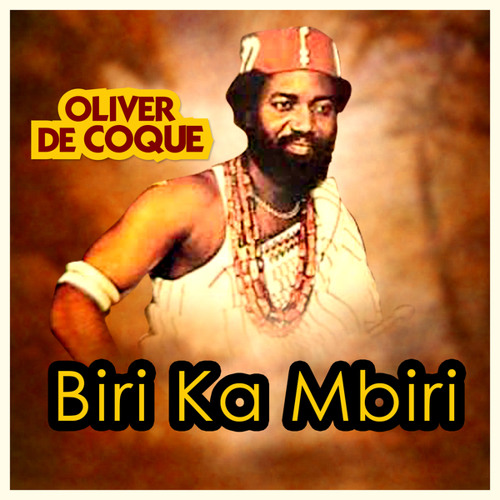
Igbo New Yam Festival in Dublin. Image by Ji-Elle via Wikimedia Commons, August 30, 2008. (CC BY-SA 2.0)
Nigerian highlife music has played an important role in the country's cultural scene since it became one of the most popular music genres in the 1960s. One characteristic of the music of this era was the mastery of instruments, which was highly emphasised in most songs. This was important since music was generally performed live. The acoustic blending of vocals with rich instrumentation – guitar or piano with ogene, ichaka, and oja — gave highlife a distinctive flavor. Igbo highlife musicians were at the forefront of these transformations in this genre of music.
From one of highlife's most prolific composers to its innovators, these are some of the key figures who have made an important mark on the genre.
Osita Osadebe

Image: Chief Osita Osadebe’s album cover for ‘Osadebe ‘78 (Vol 2)’
Osita Osadebe (1936-2007), Nigeria's King of Highlife, pioneered the transformation of the traditional Igbo singing style into highlife. Osadebe’s highlife combined the call and answer repertoire, with a fast rhythm that stimulates dance. His music was generally for entertainment, earning him the title, “Doctor of Hypertension.” As he matured as a musician, the theme of his songs shifted to social issues and the challenges he faced in life.
A prolific composer, Osadebe wrote about 500 songs. But the strength of his genius was that he handled every single aspect of his music production from composing to the live performances. This according to Osadebe was because of the lack of music directors and producers at the time. “It was basically a one-man effort,” he said in an interview. “I compose my songs, write the baseline, arrange, write my lyrics, vocals and conduct the band.”
Many of his songs like ‘Nwanne m ebizina‘ (Brother stop crying) or ‘Makojo‘ [anyi ga-ebi] (No matter how bad things are, [we will continue to live]) offers hope in the face of difficulties. One of his most evergreen hits ‘Osondi, Owendi,’ encapsulates philosophical wisdom, enriched with Igbo proverbs:
Ife sozili onye sozi chi yá/ Na enu uwa nke a anyi no nu/ O bu onye ka zi Chukwu/
O gbanari chi ya na oso nu/ O na ebukwa chi ya uzo anaba nu/ Ife na aso gi/
Okwazi ya na aso zi onye ozo nu/ Mana afa egwu a m na etizi nu/ Osondi owendi
Maka Ka Ife uwa aso ndi ufodu nu/ Etu a Ka o na ewezi ndi ufodu/
Osondi owendi/ Osondi owendi/ Osondi owendi/ Osondi owendi/ Osondi owendi
It is said that what delights one, delights his chi (personal god)/ But in this world of ours/ Who is greater than God/ He that runs faster than his chi/ Will certainly depart before his chi/ Because what delights you/ May not delight others/ But the name of the music I make is/ Osondi owendi (as it delights some, so it angers others)…
Oliver de Coque

Oliver de Coque album cover “Biri Ka Mbiri” (Live and let live, in Igbo language)
Oliver de Coque, born as Oliver Sunday Akanite (1947-2008), was a talented musician and guitarist with over 70 recorded albums. De Coque was trained by Piccolo, a Congolese guitarist living in Nigeria. His music style is characterized by all the elements of highlife but with a flair with the guitar. In fact, de Coque made the guitar-based highlife a dominant feature of this genre of music.
Like Osadebe, de Coque ran deep into the wise repertoire of his Igbo identity. With songs like ‘Biri ka m biri‘ (‘Live and let live’) and ‘Uwa bu aja‘ (‘This world is mere sand’), he emphasised the eternal truth of peaceful and harmonious co-existence with others, bearing in mind the fleetingness of earthly existence.
However, de Coque made his mark by popularizing the trend, that still exists to date, of musicians singing the praises of wealthy and famous members of society. ‘Ana Enwe Obodo Enwe’ (‘There are those who owe the city’) and ‘Peoples Club of Nigeria’ are indicative of the Igbo egalitarian spirit that emphasizes industry, travel, and tact as drivers of personal prosperity, which in turn earns them prestige and fame.
Mike Ejeagha
Mike Ejeagha was also an Igbo highlife innovator of akuko na egwu, which means storytelling, by employing music to tell Igbo folklore. This is evident in songs like ‘Omekagu’ (‘The one who behaves like tiger’) and ‘Enyi Ga Achi‘ (‘The elephant will rule’). The lyrics of Ejeagha’s songs were pedagogical, with a rich repertoire of proverbs presented in a didactic style. He was the first person to employ this style in highlife music.
In ‘Uwa mgbede’ (‘Life in the evening’), he tells the story of life — how one grows, works, and afterwards will have to face the reality of old age (uwa mgbede). Hence, people should take life easy.
Nico Mbarga
Nico Mbarga (1950-1997), a Cameroonian-Nigerian highlife musician, was born in Abakaliki, Ebonyi State in southeast Nigeria. Mbarga is famed for creating a unique hybrid of Congolese and Nigerian guitar playing. His 1976 single ‘Sweet Mother’ was one of Africa’s greatest hits, selling 13 million copies. Rendered in Nigerian pidgin, ‘Sweet mother’ remains an evergreen hit:
Sweet mother, I no go forget you/ For dey suffer we you suffer for me, yeah/ Sweet mother, I no go forget you/ For dey suffer we you suffer for me, yeah/ When I dey cry, my mother go carry me/ She go say my pikin wetin you dey cry, yeah, yeah/ Stop stop, stop stop, stop stop/ Make you no cry again oo/ When I wan sleep, my mother go pet me/ She go lie me well-well for bed/ She go cover me cloth say make you sleep/ Sleep sleep my pikin oooo
Sweet mother, I will not forget you/ For all the suffering you underwent on my behalf/ Sweet mother, I will not forget you/ For all the suffering you underwent on my behalf/ When I cry, my mother carries me/ She will say, my child why are you crying, yeah, yeah/ Stop stop, stop stop, stop stop/ Don't cry again/ When I want to sleep, my mother will pet me/ She will lay me on the bed/ We will cover me up with cloth, singing me to sleep/ Sleep, sleep, my child
As emphasized by Joseph-Achille Mbembe, Cameroonian philosopher and public intellectual, “music has always been a celebration of the ineradicability of life.” Nigeria's highlife music has emphatically enunciated this joy of living.
Read the second part of this series on how Igbo highlife music provided hope after a devastating civil war here.
Here's a playlist of old school Igbo highlife music:






